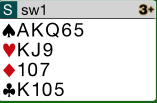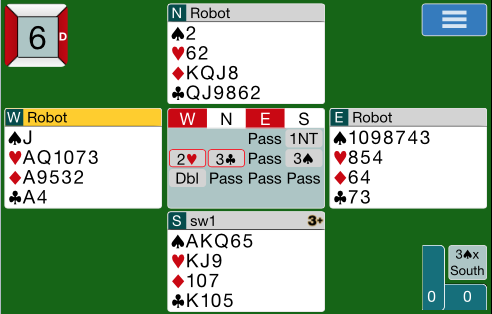The bots would certainly open 1NT: balanced hand, 15-17 HCP.

It would also meet the definition of a 1S opening, which would be something along the lines of 5+ spades, 12+ points. Nothing there to tell us which hands that meet the requirements of both should be opened 1S, which should be opened 1NT. The diamond holding tends to make 1S more attractive, but many times we open 1NT with a worthless doubleton. If the long suit were clubs or diamonds, opening 1NT would be virtually unanimous, even though the hand would also meet the requirements for 1 of a minor.
Anyway, even if you wouldn’t be in this situation because you would have opened 1S, unless you think 1NT is beyond the pale, you could reasonably decide what do after this start. (You could also note that even if someone had given you the hand to complete after opening 1NT, you would not have rebid 2S next. Maybe not, but unless 1NT and 2S are totally off the wall, you could opine now. Again, perhaps someone had handed you the cards to complete the auction after it had gotten this far.)
I said I would post the full hand today if anyone had responded, but I intended “if anyone had said what to do after the Dbl - P - P.” So tomorrow if anyone has, by Monday even if no one does.
BTW, two years ago I would definitely be in the open 1S camp. Now I consider it close, but probably would open 1NT even with a human partner. If you open 1NT, you’ll usually get to a reasonable contract, which may be 1NT. If partner has fewer than 3 spades, 1NT will usually work better. If he has 3 or more spades, opening 1S probably will. Since on average partner will have 3 spades more often than 2, that would tend to support opening spades, but not that clear: opening 1NT is not better 100% of the times that partner does not have 3+ spades; opening 1S is not better 100% of the times he does. The advantage of 1NT is simplicity; you rarely have a tough rebid decision after 1NT, but after 1S you don’t know how aggressive to be. Similarly partner has a pretty good idea of your hand, so he can make pretty good decisions.
This thinking is perhaps influenced that IRL I’ve been playing the Precision Club system a lot. In that, virtually all hands with at least 16 HCP are opened 1C (forcing, artificial). 1 of a major promises at least 5. 1NT (in my current partnerships) is 14-16 HCP (those balanced 16’s are the largest group of 16 point hands not opened 1C). Almost all hands with at least 11 HCP are opened. In that style, it works best to open 1NT frequently with a 5-card major, since otherwise you have too many rebidding problems. (Partner has to be carefull about inviting when you could have as few as 11 or 12; partner won’t be seriously misled if you invite with 15 after opening 1S since he’ll know you have at most 15, but your invite may have already put you too high).






